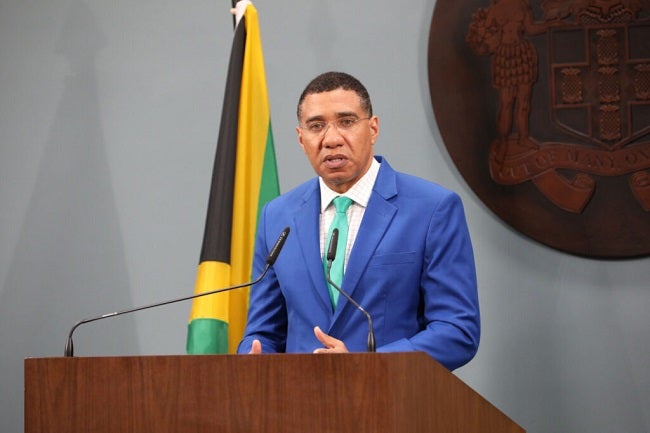Don’t be fooled by greenwashing – Jamaica lacks real climate leadership
Members of Andrew Holness’s cabinet seem to only be able to say that he’s doing better than his predecessors, but this is not enough to avoid catastrophe, writes Christina Ivey


When the Jamaican prime minister, Andrew Holness, delivered his opening statement at Cop26, nothing he said was particularly groundbreaking. He called for more funding for low carbon initiatives and commended his administration’s mangrove restoration and reforestation efforts.
Despite his calls for “urgent and decisive action”, at home, Holness’s administration continues to enact widespread environmental mismanagement. Some Jamaicans are cynical and feel that their prime minister’s presence on the world stage appears more like a money grab than a symbol of real concern for the environment.
The Holness administration, in office since 2016, has presided over a boom in Jamaica’s mining sector, driven by renewed growth in the bauxite industry. Bauxite ore is refined into aluminium, a key input in the car and aircraft manufacturing industry. A 2020 study by the Jamaica Environmental Trust found that the public health costs of bauxite mining could be as much as $13bn (£9.7bn) a year, while Jamaica earns only $1bn (£745m) per annum from it, representing less than 3 per cent of GDP in 2018.
Bauxite executives have admitted there are only about 30-40 years worth of reserves left. The government cannot continue to encourage investment into this industry, which emits one tonne of CO2 for every five tonnes of bauxite mined, while making calls for climate change adaptation funding.
In 2017, the Holness administration declared a formal boundary for the Cockpit Country Protected Area (CCPA), after decades of campaigning by environmental activists. The area is a hilly, densely forested terrain in the island’s interior, host to settlements of Jamaican Maroons, whose ancestors fled slavery. It is also home to the most expansive and well-preserved assortment of indigenous Taino architecture in the country. But despite this, the government has repeatedly explored mining opportunities that infringe on the integrity of this protected area.
For the last three years, the government has been considering an environmental permit for mineral exploration in an area adjacent to the CCPA, which experts have warned would disturb the protected land. The government has said it will not allow the Cockpit Country to come to harm, but it’s hard to believe that they would encourage exploration with no intent to mine the area.
Holness boasted of mangrove restoration in his speech, but these efforts are outpaced by their continued removal. Mangrove forests, found in low-lying coastal areas, prevent coastal erosion by acting as a barrier against storms and hurricanes. Some 2,000 hectares of mangrove were removed between 1998 and 2013. Restoration is piecemeal and is only aimed at recovering half of what was lost. In April, the administration celebrated the destruction of a healthy, mature mangrove forest, which was cleared to make way for a new hotel. It came just days after Holness attended a climate summit led by US president, Joe Biden.
The Jamaican prime minister also lauded his administration’s efforts to plant 3 million trees. The plan, now approaching its third and final year, has only seen about 656,600 trees planted as of July 2021. Jamaica’s deforestation rate is 350 hectares per year, yet it has only restored an average of 86 hectares annually since 2006. Despite missing its own targets, the nation was a signatory to the Cop26 Action on Deforestation pledge.
To keep up to speed with all the latest opinions and comment sign up to our free weekly Voices Dispatches newsletter by clicking here
A 2018 study by the Caribbean Policy Research Institute, found that Jamaica lacked a comprehensive environmental governance framework. It uncovered 24 different state agencies with overlapping responsibilities and concluded that the main obstacle to coordination was a “lack of sufficient interest on the part of the government and its agents to protect our natural environment in a substantive way”.
Daryl Vaz, the minister responsible for the environment at the time, embraced the conclusions and recommendations of the report but failed to implement them. The environmental portfolio has since changed hands and reform seems to have fallen off the agenda.
In 2023, Jamaica’s capital Kingston will be one of the first cities in the world to experience climate departure, the point when the average temperature of the coolest year from then on is predicted to be hotter than the average temperature of its hottest year between 1960 and 2005.
By chasing short-term profits, the Holness administration is wasting the time that’s left to prepare. At best, these conferences seem like a greenwashing exercise for him. In response to criticism, members of his cabinet seem to only be able to say that he’s doing better than his predecessors, but this is not enough to avoid catastrophe. No amount of funding will remedy that if they are fundamentally unwilling to change.
Christina Ivey is the environmental policy editor at ‘It’s Freezing in LA!’, an independent magazine about climate change
Join our commenting forum
Join thought-provoking conversations, follow other Independent readers and see their replies
Comments
Bookmark popover
Removed from bookmarks